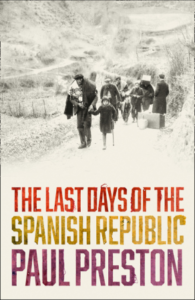 Reviewer: Wouter van Dijk
Reviewer: Wouter van Dijk
The Last Days of the Spanish Republic, Paul Preston
William Collins (imprint of HarperCollinsPublishers), London 2016
ISBN: 978-0-00-816340-2
Hardcover with dust jacket, with pictures in black and white, notes, bibliography and index
390 pages
£25,00 / €25,65
The implosion of the Republic
After nearly three years of bitter fighting and resisting Franco’s rebellious armies the Republic imploded at the beginning of March 1939 with the coup by the recently promoted General Segismundo Casado. He and his accomplices maintained their coup was necessary to prevent a Communist take-over and likewise dictatorship by Prime Minister Juan Negrín, and to ensure an honourable peace with the possibility of leaving the country for everyone who wished to evacuate. This point of view has proved itself very influential in historiography over the decades, although less could be further from the actual truth. As Preston incontrovertible ascertains in this detailed account of the last months of the Spanish Civil War, now published for the first time in English, Casado was nothing more than a cowardly traitor trying to save his own skin. Thereby he not only shunned from frequent contacts with Franco’s secret service and misleading militant anarchists to join him in his clandestine action, but betrayed as well the millions of Republicans in the centre-south zone who were simply handed over to the non-existant mercy of the Generalissimo after Casado managed to oust Negrín and took over power in the Republican territory.
Paul Preston is Professor of Contemporary Spanish History and Director of the Cañada Blanch Centre of Contemporary Spanish Studies at the London School of Economics. He is known for his bold statements and explicit views of the war in Spain and its protagonists, such as labelling Franco’s post-war policy repression as a Spanish Holocaust. Also, he is probably the most prominent historian of the Spanish Civil War outside Spain. In The Last Days of the Spanish Republic he reassesses the role of Negrín and his superhuman efforts to keep steering the Republican war effort to the effect of a conditional surrender in order to avoid reprisals by Franco after the weapons would have been laid down. In the last months of the war, we learn from Preston’s account, it was Negrín and almost Negrín alone who carried the whole of the burden of keeping the Republic afloat on his shoulders. Where many historians see in Negríns rhetoric of continued resistance in the increasingly more desperate military situation after the fall of Catalonia evidence of irresponsible leadership and needless prolonging of the war, Preston reveals it for what it was, necessary rhetoric a last bargaining chip in order to wrest concessions from Franco in order to avoid post-war reprisals. Also the much-made of Communist domination of the Republican war effort in the last months of the war as a sign of a Stalinist take-over of the Republic is disproved by Preston in a way as prosaic as it is logical; simply most of the people still committed to a last-ditch resistance against Franco were Communists. Defeatism spread widely in Republican ranks after the fall of Catalonia and those least affected were Communists. Negrín had to rely on them to implement his policy of lengthened resistance in order to achieve the Republic’s survival until a wider European war broke out that might have saved it or until Franco agreed to the conditions of surrender stated by Negrín. Negrín realized, as did few others who longed for an end of the war, that that would not bring an end to the violence and starvation endured by the Republicans. On the contrary, the mass executions and repression going on in territory captured by Franco delivered evidence enough of the doomed fate that would await any ordinary Republican civilian once Franco would occupy the whole of Spain.
Casado then, his story reveals itself as one of the most disgusting treachery and self-aggrandizement as has perhaps been surpassed only by Franco himself and the rebellion against the government in the wider sense by the top of the military. Being a typical desk officer in the Spanish army when the war broke out, Casado found himself on the Republican side and remained where he was. Although befriended with many of the rebellious offices on Franco’s side, and himself of right-wing stock, he kept to his position in the Republican army. When it became clear the war would be lost by the Republic, his virulent hatred of Communism and a vision of himself putting an end to the war without bloodshed, led him to the plotting of a coup against Negríns government in collaboration with a bunch of generals, of which the famous ‘defender of Madrid’ Miaja was one. Already thwarting the Republican war effort at the time of the Ebro offensive and ensuring its failure, at a time when there still was hope for the Republic in the war, Casado and his fellow generals now made sure the defeat of the Republic would be definitive and humiliating, although the conspirators spoke of a dignified peace once they had formed their Junta and addressed the country.
Most tragic perhaps was Casado’s deceiving of the anarchist militants and most importantly, Cipriano Mera and his Fourth Army Corps stationed in Madrid. Because success of the coup was essential in Madrid, Casado needed the support of enough military units there. Three of Madrid four army corps were Communist however, so they could not be included in the plot that after all was aimed at removing Communist influence from the Republican government. Responding to the anarchist hatred of the Communists, Casado lied them aboard his conspiracy, concealing his contacts with Francoist agents. Mera’s troops proved to be essential in quelling Communist resistance once the coup got underway, and only when it would be too late, the anarchists would find out they had been fooled by Casado and his plans to hand over Republican Spain to Franco without a further shot fired. Essentially, the anarchists were still committed to the same war aims as had been Negrín, only their envy of the Communist position blinded them from seeing this. In this very detailed account, Preston once again has shown himself a good researcher and a gifted writer. Busting yet another myth of the Spanish Civil War, Preston has revealed Casado’s coup for what it truly was, a treacherous and cowardly deed, that exposed millions of Spaniards to immediate repression and persecution.
Wouter van Dijk
